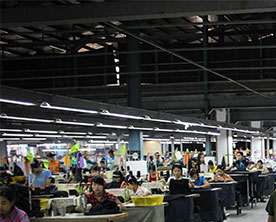A Chinese-owned garment factory in Yangon has been forced to shut down temporarily after an attack by around 500 workers demanding overtime pay and better working conditions. The attack is one of the most violent labour disputes Myanmar has seen for years.
The dispute at the Hangzhou Hundred-Tex Garment (Myanmar) Company, which was one of Swedish fashion retailer Hennes & Mauritz (H&M)’s 40 suppliers in Myanmar, started with a strike in late January following the sacking of a local labour union leader, according to workers and managers. Workers demanded a better performance review system and health care coverage. Production at the factory was halted on February 9 after the strike turned violent and a Chinese manager was attacked by dozens of female workers in a scene recorded on video.
As tensions rose, hundreds of striking workers stormed the factory on February 23 and damaged computers and surveillance cameras, as well as textile machinery.
The workers ended the strike on February 25 after the Yangon Region Arbitration Council ordered the factory to reinstate the labour union leader, Ko Thet Paing Oo, according to media reports. Damage to the production line in the February 23 incident at the factory in Hlaing Tharyar Township was estimated at $75,000 (about 102 million Kyats), assistant manager San Htwe told Reuters. In a statement issued the same day the Chinese embassy called on the government to protect Chinese businesses and property and take action against the perpetrators of the “attack”. The conflict is troublesome for H&M, which is widely seen as being at the forefront among large apparel companies in promoting workers’ rights and fair wages. H&M has suspended its relationship with the factory. “H&M group is deeply concerned about the recent conflict and our business relationship with this factory is on hold at the moment,” it said in a statement. “We are monitoring the situation closely and are in close dialogue with concerned parties. We strongly distance ourselves from all kind of violence.” it said. H&M has called on governments in sourcing countries such as Cambodia and Bangladesh to ensure fair pay for workers. It has said it cannot unilaterally require individual suppliers raise wages as it generally shares them with other brands, although according to the owner that is not the case with the factory in this dispute. Reuters quoted labour activists and industry analysts as saying that the National League for Democracy government has to do more to ensure protection for workers as well as investment stability for employers. “Industrial relations are still only a few years old in the Myanmar garment industry, and effective cooperative structures are still being developed.” Mr Jacob Clere, who works on a European Union-funded project to improve the garment industry, told Reuters. The Ministry of Labour, Immigration and Population, which was involved in mediation between workers and employers of Hangzhou Hundred-Tex Garment, said it was looking to amend laws to improve the legal framework for disputes.










